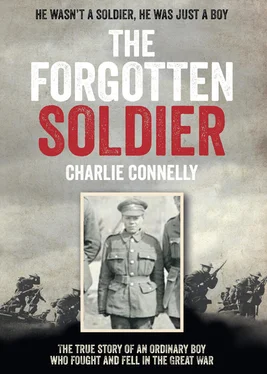When I tried to imagine what he’d been through I was trying to imagine myself in that situation: enlisting, being issued with a uniform, being trained and turned into a weapon of war, travelling out of the country for the first time ever, travelling out of London for the first time ever, being thrown into a war that had already been raging for the best part of four years, being among total strangers in a way of life and a daily routine that was completely alien to me, the subsuming of the individual into the whole, the constant threat of imminent, random death from a shell, a gas attack, sniper fire, a machine gun while advancing through no man’s land, a bayonet in a trench raid – even drowning in a flooded shell hole.
It was me I was imagining there, not Edward Connelly. It was me I was displacing from a comfortable everyday life of DVD box sets, the corner shop, Charlton Athletic, paying the council tax and eating takeaway noodles in front of Coronation Street into the world of mud, trenches, lice, Woodbines, gas masks, artillery shells, bully beef and all-pervading death. My life, my circumstances and my character were not remotely like-for-like comparable with his. Not even close.
The less I knew about Edward the more determined I became to find out. Finding the location of his grave made him slightly less of an enigma. He was out there. There was a headstone with his name on it. There was something tangible of Edward Connelly beyond a scan of a census return on a computer screen. He had left something behind, even if it was just his name chiselled into a piece of Portland stone over a box of his bones in a country that’s not his own.
It struck me that it was unlikely to the point of near certainty that anybody had ever visited his grave. He’d lain there in the Belgian soil for nearly a century, alone, forgotten and unvisited, his grave meticulously tended by committed and dedicated strangers to whom he was just a name among names. His background was one of extreme poverty: his parents would never have been able to afford to visit Belgium even if they’d had the opportunity. It might never even have crossed their minds. All his mother had was a devastating telegram, his posthumous campaign medals and her memories. No funeral, no grave to tend, none of the accepted rituals that go with the death of a loved one, and that’s even before you consider that no parent should ever have to bury their child.
Edward Connelly is a shadow flitting on the very edge of history. He left behind no letters, no diaries, no poems, no sketches – nothing. There are no anecdotes or testimonies to his character or appearance, no eulogies to the cheekiness of his smile, the twinkle of his eyes, the quickness of his wit, the kindness of his heart. There’s no clue as to whether he spent his Saturday afternoons at Queen’s Park Rangers or took the bus to Lord’s cricket ground. We don’t know if he liked a drink, jiggled baby cousins on his knee, argued with his father, brought his mother flowers when he could, tickled his younger siblings until they begged him to stop, kicked a football around the streets with his friends, took my grandfather catching tadpoles by the canal, exalted in the freshness of a spring day, liked to sing songs after a couple of drinks, was perennially late for work, had a sweetheart or paid sixpence at the music halls to hear Vesta Tilley whenever he could. Was he known as Eddie, or Ted, or Ed, or something else altogether? We’ll never know because he’s gone. All of him is gone. He’s a name written on a handful of official documents and chiselled into a gravestone. Edward Connelly has no legacy.
I have nothing in common with him beyond a surname and the fact that his middle name matches my first name. I don’t know why it troubled me so much that my great uncle had been forgotten, why I could still hear that silence on the end of the phone whenever I thought about him. It was the silence that troubled me most, because it seemed it could never be broken.
When it became clear that he really had left nothing behind, my increasing desire to find out more about Edward Connelly forced me to take a different approach, an approach that led to two resolutions. If I couldn’t find Edward’s own personal story then I’d try to piece it together in other ways. I’d find other people’s stories. I’d seek out letters and diaries of lads like Edward, ordinary young men born at the twilight of a century and thrust into extraordinary circumstances while they were barely coming to terms with adulthood. Lads who never rose through the ranks, who didn’t write inspiring stanzas that would fill anthologies for decades to come, who in most cases did nothing special except survive. Lads who would have known the reality of the dugout, the duckboard, the puttee, the mess tin, the endless parade ground drilling, the channel crossing, the glare of the Very light, the whistle of the incoming shell, the banter, the songs, the latrines, the zing of a passing bullet, the ceaseless rain, the cloying mud and the constant presence of death.
I might not get to know Edward Connelly personally, but if I could get to know the lads who were there and left their memories behind then maybe, just maybe, I might know something of Edward Connelly, the life he led and the war he endured and almost survived.
In addition I wanted to make amends, probably to assuage my own wishy-washy feelings of guilt as much as anything. But I sincerely believed that the family owed Edward something for the near century of silence. When I found the Harlebeke New British Cemetery on a map I knew exactly what I had to do. I’d set off to walk from his birthplace in West London and keep walking until I reached his grave in Flanders, making a literal journey through his life and his war. A pilgrimage of sorts, and a penance, I suppose. From my home in London I could board a couple of trains and be at his graveside in barely three hours, but that felt far too easy; he deserved more of an effort than that. If I was going to be Edward’s first ever visitor I’d have to put in a bit more work than tapping my card details into the Eurostar website and booking a hotel. By making the journey from his cradle to his grave – on foot, out on the road, free of distraction – I’d have time to think about him and his war: crossing the channel as he did and seeing the horizons he saw, the towns he passed through and, finally, the grave where he lies.
From archive to footpath, I was going in search of Edward Connelly, the forgotten soldier.
2
‘The boy from Soapsuds Island’
Edward Connelly was born on 25 April 1899, on the cusp of the twentieth century and in the twilight of the Victorian age. Indeed, as Edward drew his first breath, final tweaks were being made to the plans to mark Queen Victoria’s eightieth birthday celebrations: in high streets across the land men sawed and hammered away on massive triumphal arches to be covered in flowers and draped with flags and banners.
Elsewhere, the new, £27,000 Palace Pier in Brighton was undergoing its last lick of paint ahead of its grand opening a few weeks hence. Aston Villa and Liverpool were neck and neck at the top of the Football League as the season entered its final weeks; W.G. Grace was a few weeks away from playing his final Test match.
Joseph Conrad’s Heart of Darkness had just completed its serialisation in Blackwood’s Magazine , while Rudyard Kipling had recently published ‘The White Man’s Burden’. Edward Elgar was putting the final touches to his Enigma Variations as Monet was establishing himself on the fifth floor of London’s Savoy Hotel, ready to commence his famous series of Thames paintings.
Guglielmo Marconi was sending the first radio signals across the English Channel, on the other side of which the messy Dreyfus affair was finally drawing to a close: the much-sinned-against French officer would be out of prison before the century ended. The Boxer Rebellion was prompting endless column inches in British newspapers on the moral failings of the Chinese, while even further away the British Antarctic Expedition was hunkering down for the first ever over-wintering on the continent.
Читать дальше












